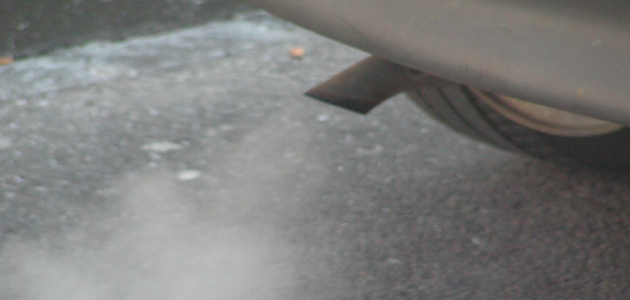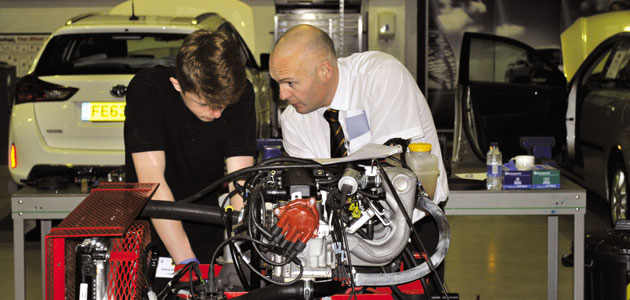
At the time of writing the vast majority of PMM readers will now be aware of the news that broke at the turn of the year, regarding a change to MOT test legislation that could have a significant impact on the sale, service and repair of diesel engine vehicles.
If you’re yet to be acquainted with the subject then click here to find out more about the finer details.
Such was the scale of the announcement that it was covered by mainstream news outlets, many of which are yet to begin scratching the surface in terms of a more thorough examination of the story.
In summary, a check of the physical presence of a Diesel Particulate Filter (DPF) had previously been omitted from the annual MOT test process; this despite legislation stating that the modification of a vehicle to such an extent that it contravenes air pollutant emissions standards is illegal and will result in a fine for those found in breach of such laws.
This has recently be addressed by the Department for Transport (DFT) following significant pressure from environmental groups, concerned at the impact non-functioning DPFs could have on our planet. A fair argument, considering the component is fitted to the vehicle at manufacture with the task of keeping emissions legislations below a target level and allowing car manufacturers to remain compliant with the current Euro V regulations.
The result is an amendment to MOT legislation that ensures testers carry out a visual check of the component to ensure a DPF is still fitted. This, the government hopes, will nix the practise of DPF ‘removal’ or ‘deletion’, a service offered by many reputable independent garages in the UK.
As DPF issues have continued to affect car drivers in a period of austerity, mainly due to a lack of consumer awareness about how diesel engine vehicles should be driven to ensure as few issues as possible occur during the lifetime of the vehicle, it’s easy to sympathise with those who have looked to other routes to avoid the often hefty bills that come with DPF-related complaints.
After all, before the recent legislation change (which comes into force in February), the car driver was likely unaware of a) the function and role of the DPF and b) the implications of its removal. Who can blame those that may have taken a ‘if it’s not part of the MOT test then it can’t be that much of a big deal’ attitude to proceedings, particularly when the repair costs involved with DPF repair and replacement can reach eye-watering levels?
Equally, how can scorn be poured on those garages that have decided to service this market demand by investing in the equipment required to do so? Some will argue that garages should make it their business to know everything about the way a car functions, and the ethical consequences of ignoring this information to make a quick buck could leave a further stain on the industry, but judging by the outpouring of debate about the issue in recent weeks, it appears that confusion rather than clarity prevails from most areas of the sector when it comes to this particular subject.

What is crystal clear though is that this issue is going to be one of the main talking points of 2014 and there are many more questions than answers currently. These include:
a) What happens in the event that a customer demands compensation from an independent garage on the grounds that the garage provided a service that would now make their vehicle ‘illegal’?
b) What is the direct effect on the insurance premium of any vehicle found to have had its DPF removed – particularly if MOT test time is still some months away?
c) If a vehicle fails the MOT – having had the DPF removed beforehand – will the cost of having a replacement fitted, plus software re-coding etc, mean that more cars will simply be headed for the scrap heap?
d) What does a check of the DPF during the MOT consist of?
Furthermore, it appears that none of the major motoring organisations or associations that serve our industry are keen to stick their head above the parapet at this time in order to provide independent garages with more clarification about the subject. Without wanting to push criticism in the direction of anyone in particular, questions do have to be asked about whether the Government and the newly formed Driving and Vehicle Standards Agency (formerly VOSA) were caught on their heels in the first place, particularly as the practise of DPF removal has been around for some time.
We’d expect the DVSA to be forthcoming with as much information as possible in the coming weeks and would hope that the likes of Motor Codes, the RMI IGA and IAAF will be sharing advice with their members because there is a very real possibility that garages could find themselves in the middle of a minefield – particularly those that have been complicit in the initial removal of the DPF.
An advisory pack or guide to show garages how to deal with certain scenarios that might arise would be a very welcome start and, once that roadblock has been cleared, there need to be some bigger and more pertinent questions answered on this subject.
The biggest of these is the initial sale of diesel vehicles to the customer and the information that is shared with them on purchase. We’re in absolutely no position to confirm the types of conversations that go on between car salesmen and ‘Joe Public’, however there have been far too many occasions where we’ve had chats with car owners who’ve experienced DPF problems due to an ignorance of the driving habits that need to be adhered to ensure the DPF does not become clogged, to be convinced that this is simply just a coincidence.
There are no doubt a number of diesel owners out there that have simply ignored or not listened to this advice, but when you see a mother of three children or an elderly person suffering DPF issues because they only drive a few miles a day around town, you do have to question whether these people were armed with the facts in the first place when they were making the purchase. And, if not, is this the type of issue that Trading Standards should be investigating? On the flip-side, are servicing/repair outlets sharing enough information about DPF maintenance and function when the customer comes in with a DPF issue?
There is so much still to be said on this story, and we’ve not even scratched the surface in terms of looking at whether the DPF really is a ‘fit for purpose’ component, and substantiating the claims of those that state the vehicle is environmentally better off without having one functioning anyway. That argument is for another day, as the real issue to hand is making sure garages and their customers are armed with the facts as soon as possible.
PMM would be keen to hear from any of the trade bodies or organisations that serve the interests of our industry to further make sense of some of the confusion surrounding this subject (as little comment appears to be forthcoming at the moment) and we’d also love to hear the views of independent garages as well.
Feel free to contact us at pmm@hamerville.co.uk or on 01923 237799.









